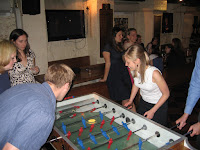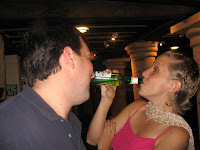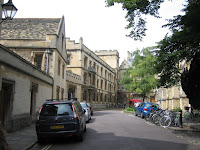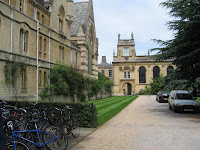To-morrow, and to-morrow, and to-morrow,
Creeps in this petty place from day to day
To the last syllable of recorded time;
And all our yesterdays have lighted fools
The way to dusty death. Out, out, brief candle!
Life’s but a walking shadow, a poor player,
That struts and frets his hour upon the stage,
And then is heard no more; it is a tale
Told by an idiot, full of sound and fury,
Signifying nothing.
Shakespeare: Macbeth.

After having a quick bite at the Mitre, Chelsey, Nichole and I went to
Queen’s College to see the
Cambridge Taverner Choir perform, under the direction of Owen Rees.
The theme of the concert was What is our life?: Renaissance Laments and Elegies, and the program included works from the Franco-Flemish Tradition, from Spain and from England. The concert cost £8 and lasted for an hour with a twenty minute intermission.
The poems that follow were part of the repertoire, both of which capture the theme of “human mortality and transience, and the insignificance of worldly achievement”.
When David heard that
Absalom was slain, he went up to his chamber over the gate, and wept. And thus he said: O my son Absalom, would God I had died for thee, O Absalom my son.
What is you life? A play of passion,
Our mirth the music of division.
Our mother’s wombs the tiring-houses be
Where we are dressed for this short comedy.
Heaven the judicious sharp spectator is,
That’s its and marks still who doth act amiss.
Our graves that hide us from the searching sun
Are like drawn curtains when the play is done.
Thus march we, playing, to our latest rest:
Only we die in earnest, that’s no jest.
Sir Walter Raleigh
 The last couple of weeks at Bread Loaf are hard, not so much because of the work, but because it is when everyone is finally comfortable in the place and with the people. It becomes a critical time when, in addition to studying and getting good grades, everyone is interested in the last hurrah!
The last couple of weeks at Bread Loaf are hard, not so much because of the work, but because it is when everyone is finally comfortable in the place and with the people. It becomes a critical time when, in addition to studying and getting good grades, everyone is interested in the last hurrah!  incredible conversation.
incredible conversation.










































 Rousham House
Rousham House









